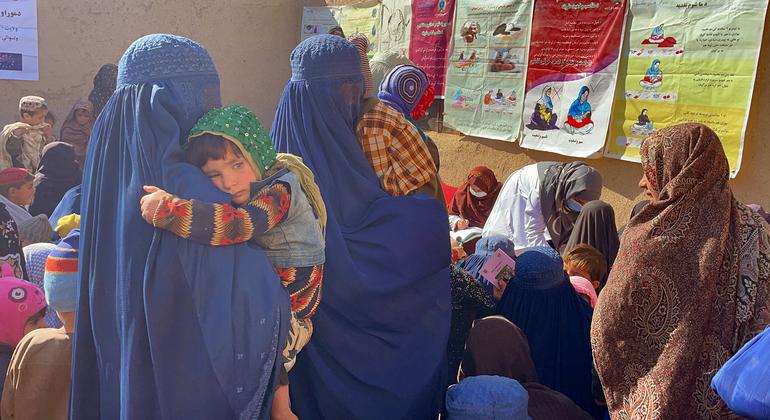Afghanistan: Women tell UN rights experts ‘we are alive, but not living’

“We are alarmed by the prevalence of mental health issues and the accounts of Suicide is on the rise among women and girls,” they said in a joint statement. “This is an unfortunate situation of discrimination based on gender in Afghanistan next to anywhere in the world.”
‘extreme’ classification
Since the Taliban took power in Afghanistan in 2021, the de facto authorities have issued several restrictive orders that are “Gender-Based Discrimination” and a systematic chipping away of the rights of women and girls, they warn.
in progress”horrible” violation of human rights has masked other manifestations of gender-based discrimination that predate the Taliban rule and have “deeply entrenched in society and even normality”, they added.
Currently, there are women forbidden to be in school above the sixth grade, including the university, can only be provided care by female doctors, and be forbidden to work in the UN and non-governmental organizations (NGOs).
‘Life under house arrest’
The special rapporteur on the situation of human rights in Afghanistan, Richard Bennett, and the Chair of the group working on discrimination against women and girls, Dorothy Estrada-Tanck, share their preliminary observations, including meetings with Taliban leaders and grave account from the women and girls they met in Kabul and Mazar-e-Sharif, in Balkh province, between 17 April and 4 June.
“Many women share feelings of fear and extreme anxiety, describing their situation as a life under house arrest,” they reported.
“We are also concerned by the fact that the women who protested peacefully against these oppressive measures met with threats, attacks, arbitrary detentions and torture,” they said.
Great grief
For two years, the de facto authorities have dissolved the legal and regulatory framework of the company “ruling by the majority.” most illegal means”disrupt the relative progress towards gender equality achieved in the past two decades, they say.
In meetings with the Taliban, experts said that the de facto authorities had told them that women were working in the health, education, and business sectors, and they were convinced that women can work according to Shariaseparated from men.
The de facto authorities repeat their message that they are work on opening schoolswithout providing a clear time, and showing that the international community should not interfere in the internal affairs of the country, experts added.
However, they noted that the Taliban impose certain definitions of religion “that do not seem to be shared by many Afghans”.
‘Alive, but not living’
Experts say one of the women they spoke to told them, “we are alive, but not alive“.
The consequences of restrictive measures have led to Detention for alleged “sexual crimes” under the “equilibrium rules” measures, they say. There are also new rules Decimated system of protection and support for those fleeing domestic violence, leaving women and girls with no return.
The effect is alarming, the experts said, noting that the new measures against the Taliban have contributed to it rise in the rate of children and forced marriageas well as additions of gender-based violence do it with carelessness.
“These actions do not occur in isolation,” they warned. “If we have to eliminate discrimination and break the effects of violence, gender justice requires a thorough understanding of the cause of such crimes.”
‘gender apartheid’
life”he could not close his eyes,” they warned.
They recommend that the international community develop normative standards and tools to address “the sheer breadth of female discrimination” such as the institutional system of exclusion, segregation, humiliation, and exclusion of women and girls.
At the same time, UN should accept it A process based on human rights which requires a deep understanding and analysis of its processes, they say.
Knowledge and financial partners should be considered increase their support to the activists and organizations in Afghanistan and to the tireless efforts of “still vibrant in society“To avoid the complete destruction of the urban space which could have irreversible consequences, they recommended.
They urged the de facto authorities to honor promise to the protection and promotion of all the rights of women and girls and in accordance with the obligations under the instruments to which Afghanistan is a State party, including the Convention on the Elimination of All Forms of Discrimination Against Women (CEDAW).
Special Reporters
The experts hope to present to the Human Rights Council in May a joint report analyzing the situation of women and girls’ rights in Afghanistan, followed by an interactive discussion with Afghan women.
Special rapporteurs and other rights experts are appointed by the UN Human Rights Council, are authorized to monitor and report on important issues or national situations, are not UN employees and do not receive a salary for work they.









